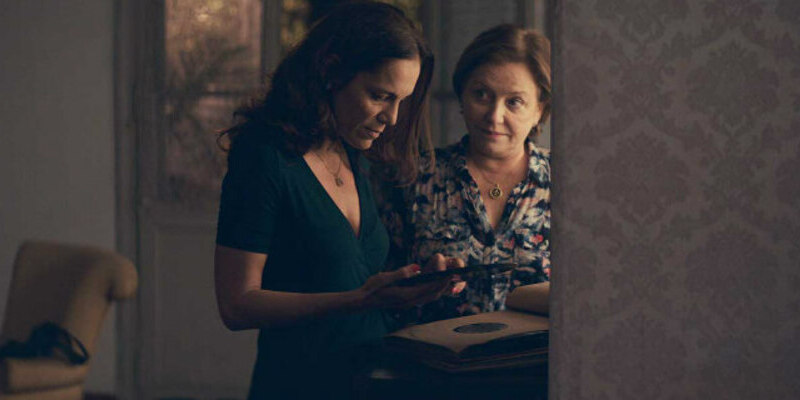
When her partner is imprisoned on fraud charges, a previously wealthy
woman is forced to take up work as a taxi driver for elderly ladies.
Review by
Benjamin Poole
Directed by: Marcelo Martinessi
Starring: Ana Brun, Margarita Irun, Ana Ivanova, Nilda
Gonzalez, María Martins, Alicia Guerra

With bravura idiosyncrasy, writer/director Marcelo Martinessi’s
The Heiresses opens with the insidious envelopment of a horror
film set piece. From a direct, handheld-camera point of view of a stranger,
who is secluded in a closet peering through a crack in the door, we witness
another couple of unknowns wandering about a palatial apartment, sizing up
the various heirlooms and knickknacks with a view to purchasing them. The
moment is both creepy and perplexing, as personal as it is disorientating:
who is who, and where should our sympathies lie?
The film’s use of a cinematic grammar more familiar to slasher movies is
pertinent: this is a film where the characters are under a persistent and
inescapable threat, but unlike the pretty young things of a mid-level
horror, the leads of The Heiresses are two elegant ladies of a
certain vintage, who are facing increasing financial ruin in their autumn
years.

Partners Chela (Ana Brun) and Chiquita (Margarita Irun) are
descendants of wealthy families and live in post-revolution Asunción. The
horror codes appropriated in the film’s singular opening are echoed in
The Heiresses’ Euro-Gothic mise-en-scene; chiaroscuro drawing rooms, bleak urban
concrete, lavish curios anchoring the febrile present to a long gone past
(think the antique flats of REC, The Orphanage’s sickly colour palette). And as in all true Gothic, the expressive milieu
is indicative of the female leads’ psychology; once securely profligate, now
being taken apart piece by piece. Because this is the thing about being
rich, about being handed a minted existence on a silver platter: you never
have to work or hustle for anything, you never have to learn and grow.
Unless you take responsibility, life is reliant upon the largesse of your
legacy.
For Chela and Chiquita, it is almost too late. And, furthermore, here is
the thing about being in the gays, too: unless you are very fortunate, the
chances of fostering a family are slim, and we all know that the main reason
people have children by choice is to ensure that there is someone to look
after them in their dotage. Chela and Chiquita are alone and preserved in
aspic, yet outside the mahogany panelling of their flat the world moves on,
and also begins to move in on them…

Soon into the film Chiquita is sent to jail for fraudulent activity,
leaving Chela destitute. She is forced to sell the furniture and gewgaws of
her apartment (hence the spooky opening, which in context becomes a
desperately sad metaphor: a woman forced to watch in impotent shame as her
life is dismantled by strangers), and, through a series of serendipities,
ends up taking a role as taxi-driver to the various other ladies of luxury
within her circle. Chela has not even driven for decades, and, really, the
indignity of it: from a life of untrammelled leisure to enabling the freedom
of others.
Martinessi has great sympathy for his lead, filming domestic action with up
close and personal angles; transposing the voyeurism of the film’s prologue
to the viewer, ensuring a carefully constructed complicity. And, in fact,
there is even the suggestion that the incarcerated Chiquita may have had the
better deal than her partner. Her prison is open plan and full of female
criminals of the non-dangerous kind who all seem to get on. A marked
difference is evident in the stylisation of Chiquita’s scenes, which are
colourful and full of a messy, insistent energy which contrasts the slow,
airless world she has left behind (it makes you wonder who is really in
prison, amirite?).

Is there hope for redemption? Well, Chela does strike up a May to December
friendship with the ostensibly straight Angy (Ana Ivanova), whose
brazen manner and upfront sexuality is inspiring to the older woman. The
dynamics at play are relative; Angy is (I’m guessing) mid-forties, ancient
by the youth-obsessed disingenuity of Hollywood standards. It is utterly
damning of cinema in general that these sorts of representations are novel
and noteworthy in and of themselves.
Yet, the candid matter of fact
portrayal of female physicality in The Heiresses is beautiful,
with wrinkles and spreads displayed with a gorgeous honesty. And in this
film, which is seemingly committed to a ‘crinkles and all’ truth, can we
expect a denouement which explicates a freedom for Chela? The film’s title
would suggest not, as in this world, these women are helplessly defined by
the social constructs and attitudes which have created them.

The Heiresses is on MUBI UK
now.
